Glance at any random skin care product and it’s likely that water (or aqua/eau) is listed as one of the first few ingredients, if not the first. You may not realize it, but water plays a significant part in a lot of our beauty products. (That’s not including the water we use to wet our faces when cleansing.) Some brands have even based entire ranges on the humble ingredient, like the thermal spring water at the heart of all the products by Avène, Vichy and La Roche-Posay. Water, no doubt, provides many benefits for our bodies and skin, but there’s a new crop of water-free skin care products hitting the market.
Why Water Is in Skin Care Products
Let’s start with the basics. If you’re wondering why water is so prevalent in skin care products, it’s not just because it’s a cheap filler, although that can be a reason. To get technical, Dr. Yoon-Soo Cindy Bae, clinical assistant professor, NYU Dermatology and associate at the Laser & Skin Surgery Center New York, explains that active ingredients (e.g., AHAs) require a solvent to dissolve into. Water acts as a type of solvent, hence its popularity.
Our body composition is another reason water formulas have saturated the market. “Humans are water-loving creatures; our bodies contain 60 percent water,” explains Tina Griffin, director and resident skin care expert at Blitz Facial Bar. Water naturally delivers hydration to skin and good old H2O absorbs into skin faster than oil.
Bae adds that water cools skin (think about the effect of a facial mist) and that it often improves a product’s texture so it doesn’t come across as greasy. Not to mention the benefits of “special” waters, such as mineral-rich spring waters, which are touted for their soothing and softening effects and for delivering antioxidants.
The Negatives of Water in Skin Care Products
Despite the many benefits, there are some downsides to water as an ingredient. Formulas with a high concentration of water often require preservatives to prevent microbial growth, says Griffin. The issue with preservatives is that they can be linked to health risks and skin irritation. This is why we’re seeing self-preserving beauty products gaining popularity.
If a product contains a mix of water and oil, Bae says it will need an emulsifier, which could irritate skin. Water can also dilute the active ingredients in a product, rendering it less effective.
The Advantages of Water-Free Skin Care
The advantage of cutting out water is it gives other ingredients room to shine. “The idea behind a water-free product is to create a formula with only pure and potent botanical extracts or oils as a base. In many cases, this will give you a more concentrated, non-diluted formulation packed with actives,” says Sarah Lee, co-CEO and co-founder of Glow Recipe.
In addition to getting a purer formula, many water-free products don’t contain preservatives, which means less chance of irritation, states Bae. What’s more, water-free skin care formulas, like powder cleansers and solids, are beneficial for travelers because there’s no concern about pesky TSA liquid restrictions.
A thing to note about water-free skin care products is that some may need to be applied to wet skin or washed away, especially in the case of cleansers. The distinction is that they don’t have water in their formulas.
Water Alternatives
The product type will dictate the ingredients but oils, botanical extracts and even alcohol can sometimes be used as solvents in place of water. “We’ve seen botanical extracts and oils, such as aloe, bamboo sap and green tea extract used in a formula in place of water,” says Christine Chang, co-CEO and co-founder of Glow Recipe.
As for why water-free skin care products are taking off now, the experts cite a combination of things, including consumers becoming more conscious of what goes into their beauty products, more knowledge about harsh preservatives, the rise of natural beauty and the desire for portable, hassle-free beauty products.
Griffin reminds us that the ultimate decision should be about choosing what skin needs. “You should not base your decision on water-free versus water-based products. Instead, choose products based on your skin type,” she recommends. “If your skin is dry, a water-free product containing oils, such as vitamin E, will provide more benefits. If your skin produces an abundance of oil, water-based products will prevent clogged pores.”
Ready to give water-free skin care products a try? Click through the gallery to see some solid options.
Why Water-free Skin Care Products Are Having a Moment
-
Lancer

Advanced C Radiance Cream With Vitamin C Collagen Cofactor 10x, $85 at Sephora
Vitamin C is a powerful yet temperamental ingredient and the formula can make or break how effective it is. This water-free cream contains 10 percent vitamin C and retinol to exfoliate skin and minimize the appearance of dark spots and blotchiness. It also has shea butter for a boost of hydration. Use it twice a day for a radiant, more even complexion.
-
Whamisa

Organic Flowers Olive Leaf Mist, $38 at Glow Recipe
Who said that all facial mists are packed with water? This one isn't. Instead, it's formulated with a blend of green tea, aloe vera and olive extracts that has been naturally fermented to preserve potency. The result is a hydrating mist that's suitable for all skin types. Use it as part of a regular routine and throughout the day when skin needs a pick-me-up. It can be used over makeup.
-
Ecco Bella

Organic Water-Free Vanilla Herbal Body Lotion, $25.95 at Ecco Bella
This luxurious body lotion is packed with moisture, but not a drop of water. It's formulated with seven organic oils and butters, along with a special vitamin E blend, which has a formula 50 times more powerful than standard vitamin E. Want more reasons to love it? It's 70 percent organic, gluten-free, naturally preserved and has a delectable vanilla scent.
-
Lush

Full of Grace Serum, $16.95 at Lush
How many serums look like this? The solid moisturizer melts on skin so pores can absorb all of the oils and butters. The water-free formula is kind to sensitive skin as it has calming calamine powder and antioxidant-rich mushroom extract.
-
The Ordinary

Vitamin C Suspension 30% in Silicone, $6.80 at The Ordinary
Leave it to cult skin care brand The Ordinary to offer water-free products. This vitamin C (30 percent pure L-ascorbic acid) suspension remains stable thanks to the absence of water, while the lightweight silicone helps it glide on smoothly.
-
Nannette de Gaspé

Youth Revealed Face Restorative Techstile Masque, $105 at Nannette de Gaspé
There are plenty of face masks to choose from, but Nannette de Gaspé is gaining a reputation for luxurious masks that are waterless. The paraben-free, dermatologist-tested formula has a whopping 87 percent actives to hydrate and minimize the appearance of wrinkles. Unlike most sheet masks, this one can be reused up to three times because it can be hygienically resealed after each use. It makes the price slightly less eye-watering.
-
Farmaesthetics

Nutrient Dense Fine Facial Oil, $58 at Farmaesthetics
Facial oils are another great option for water-free skin care. This treatment blends nine organic oils that are rich in antioxidants. Together they help boost luminosity and provide hydration. The formula is surprisingly light and works for all skin types, from dry to oily. Apply a few drops to a clean face morning and night. FYI: The oil still works under makeup.
-
LJH
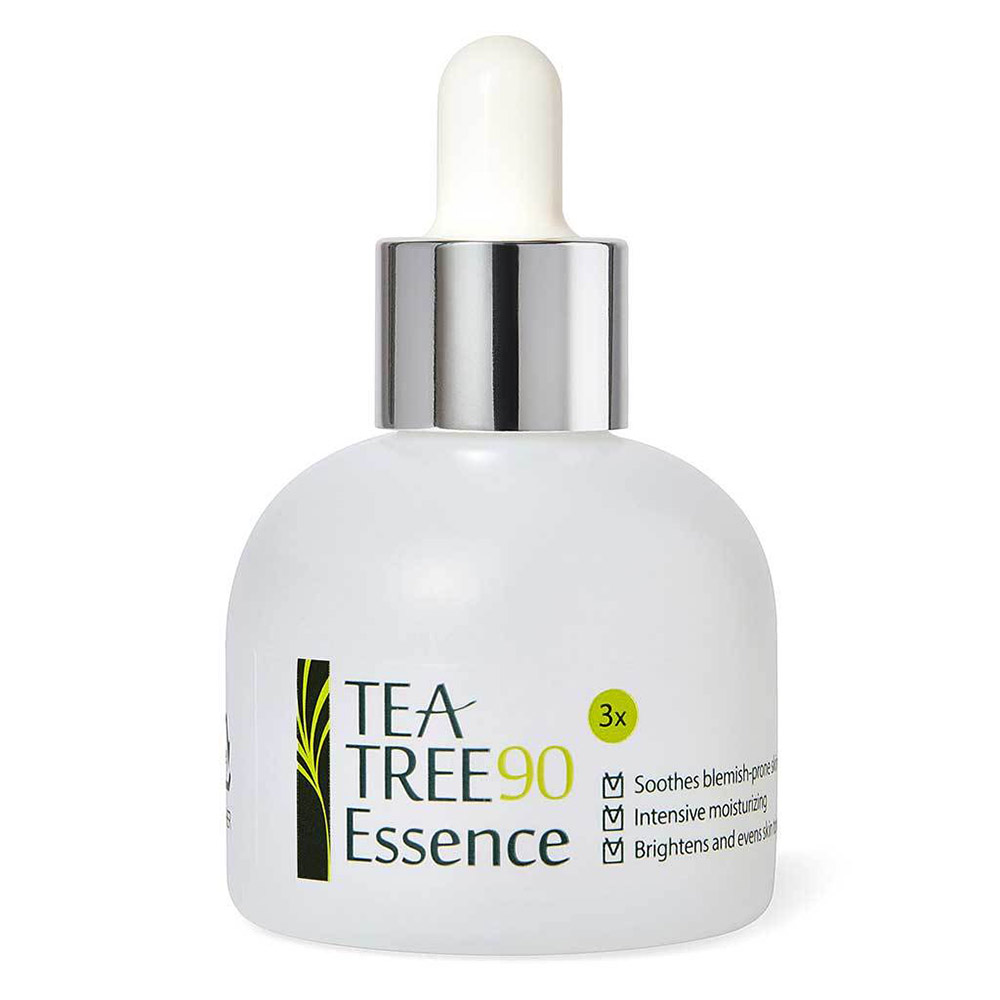
Tea Tree 90 Essence, $45 at Glow Recipe
Tea tree extract makes up a staggering 90 percent of this formula. It's blended with sea buckthorn extract and 2018's It ingredient centella asiatica to create an effective treatment for troubled, sensitive skin. In addition to being water-free, the essence is formulated without mineral oil, alcohol, parabens, silicones and colorants. The bottle will last a long time considering only a pea-size amount is needed to cover the entire face.
-
Meant
The Absolute Balm, $45 at Meant
Water? Nope. Parabens? Nope. Sulfates? Nope. Phthalates? Nope. And you can count out mineral oil, silicone, synthetic fragrances and dyes, propylene glycol, TEA and DEA. What the balm does have is a rich blend of pomegranate, coconut oil, shea nilotica and beeswax. What's more, it has an invigorating scent courtesy of grapefruit and bergamot. For an extra refreshing feeling, stash the package in the fridge on hot days. It will keep the product at the right consistency and have a cooling effect when rubbed on. Ahhh.
-
Biossance
Squalane + Antioxidant Cleansing Oil, $30 at Sephora
Cleansing oils are a great option for those looking to try the water-free skin care trend. This nontoxic formula is made with sustainable ingredients, including 100 percent plant-derived squalane and hemisqualane. Apply the product to dry skin and it will dislodge makeup, including caked-on foundation. After massaging the oil in, wet skin to wash away the residue.
-
Sunday Riley
Good Genes All-In-One Lactic Acid Treatment, $158 at Sephora
This treatment is a splurge, but it's effective. The star ingredient in the water-free formula is high-potency, purified-grade lactic acid. It gently smooths skin while boosting radiance. Say goodbye to patchiness and hyperpigmentation with continued use.
-
Derma E
Nourishing Rose Cleansing Oil, $17.99 at Derma E
Only a dime-size amount of this soothing rose cleansing oil is needed. The water-free product has argan and jojoba oils that help eliminate bad oils but keep the good ones. That means skin isn't left feeling dry and tight. After gently massaging on the product, use a damp cloth to pat it off. That's the only water involved.
